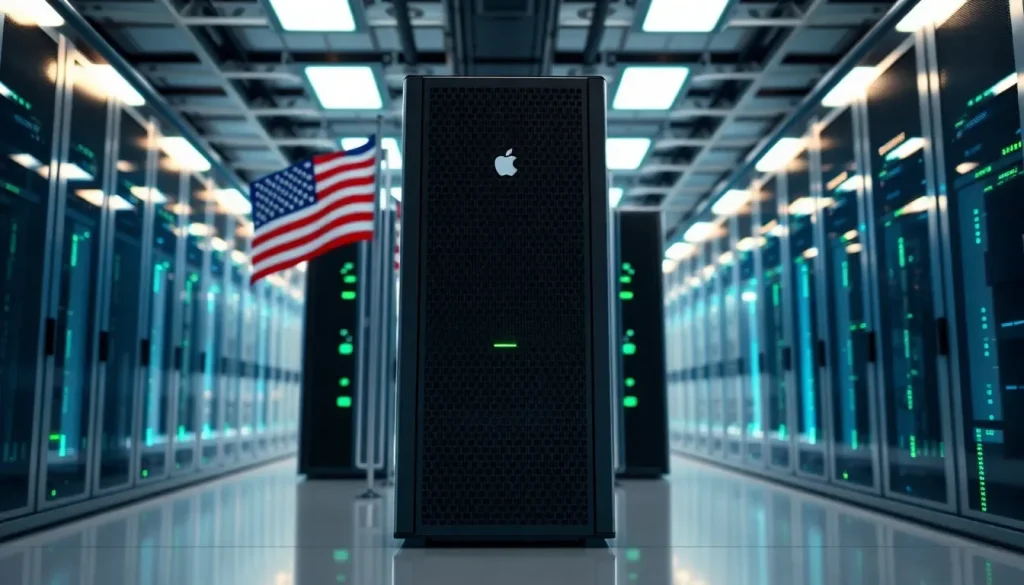Apple begins shipping US-made servers to datacenters as part of $600 billion pledge

Apple is taking significant strides towards fulfilling its ambitious vision of reshaping the technology landscape in the United States. This initiative not only reflects the company's commitment to domestic manufacturing but also highlights its response to changing geopolitical dynamics. With the announcement of shipping U.S.-made servers, Apple is signaling a new chapter in its operations.
- Tim Cook announces the shipment of U.S.-made servers from Houston
- Apple's 0 billion investment plan: A commitment to U.S. manufacturing
- Enhancing research and development in the U.S.
- Adapting to global supply chain challenges
- Apple's manufacturing footprint in the U.S.
- The future of Apple's U.S. operations
Tim Cook announces the shipment of U.S.-made servers from Houston
In a recent post on X, Tim Cook confirmed that Apple has commenced shipping its advanced servers manufactured in the U.S. from a new facility in Houston, Texas. These servers are set to enhance the infrastructure of Apple's data centers, which are crucial for powering various services, including Private Cloud Compute and Apple Intelligence.
Private Cloud Compute leverages on-device capabilities to perform simple AI tasks while offloading complex computations to Apple's cloud servers, ensuring efficiency and data security. This advancement is vital for the enhancement of numerous Apple services, including a more responsive Siri and other AI-driven features.
The decision to establish this manufacturing facility in Houston is emblematic of Apple's broader strategy to adapt to evolving market conditions, particularly in light of tariffs and international trade tensions. This move aligns with Apple's dual-response strategy to navigate the complexities posed by trade regulations:
- Relocating the primary production of its iPhones from China to India.
- Committing to a substantial investment in U.S. manufacturing to mitigate the impacts of tariffs imposed by the Trump administration.
Apple's $600 billion investment plan: A commitment to U.S. manufacturing
Apple's recent investment pledge of $600 billion over a four-year span marks a pivotal moment in the company's ongoing commitment to U.S. manufacturing. This significant investment will facilitate:
- The creation of an end-to-end silicon supply chain in the U.S., partnering with key industry players such as GlobalWafers America, Texas Instruments, Samsung, and Amkor.
- Expanding collaborations with companies like Corning to source domestically produced display glass, ensuring quality and reliability.
- Establishing a state-of-the-art AI server manufacturing facility in Houston.
- Increasing data center capacity in various states, including North Carolina, Iowa, Oregon, Arizona, and Nevada.
This robust financial commitment will not only bolster Apple's manufacturing capabilities but also create thousands of new jobs across the country, significantly contributing to local economies.
Enhancing research and development in the U.S.
As part of this investment strategy, Apple is also doubling down on its research and development efforts, particularly in the fields of silicon engineering, software development, and artificial intelligence. This focus will enhance Apple's technological prowess and innovation capabilities.
- The establishment of a "Manufacturing Academy" in Detroit aims to equip the workforce with necessary skills, fostering talent and expertise in manufacturing techniques.
- Apple's commitment extends to improving its R&D activities, which will enable the company to stay at the forefront of technological advancements.
Adapting to global supply chain challenges
Amid ongoing global supply chain recalibrations, Apple is also making strategic shifts in its operations. For instance, the company has recently shifted the final assembly and packaging of its Vision Pro headsets to Vietnam, demonstrating its agility in adapting to new manufacturing landscapes.
Additionally, Apple plans to produce a range of smart home devices in Vietnam, including:
- A tabletop AI robot equipped with multiple motors and sensors for enhanced mobility.
- A new HomePod featuring a 7-inch screen designed to manage smart household devices.
- Indoor security cameras that integrate seamlessly into home automation systems.
Apple's manufacturing footprint in the U.S.
Apple's investment in U.S. manufacturing is not new, but the scale and scope of its current initiatives are unprecedented. The Houston facility represents just one facet of a broader strategy to enhance domestic production and reduce reliance on overseas manufacturing.
Other notable manufacturing locations in the U.S. include:
- Kentucky: Focused on producing components for various Apple products.
- North Carolina: Hosting data centers that support Apple's cloud services.
- Iowa: Engaging in semiconductor manufacturing partnerships.
The future of Apple's U.S. operations
As Apple continues to expand its manufacturing operations in the U.S., it sets the stage for a new era of technological innovation that prioritizes domestic production. This shift not only strengthens Apple's supply chain resilience but also enhances its ability to meet consumer demand efficiently.
With ongoing investments, Apple is poised to solidify its role as a leading player in the tech industry while contributing to economic growth in the U.S. This shift reflects a broader trend among multinational corporations to rethink their supply chain strategies in response to geopolitical challenges.
For those interested in a deeper insight into Apple's investment commitments and its implications for the tech landscape, check out this informative video:
This ongoing evolution of Apple's manufacturing strategy not only aims to enhance its operational efficiency but also ensures a robust future for American manufacturing in the tech sector. With a focus on innovation and domestic production, Apple is setting a precedent for other companies to follow.




Leave a Reply